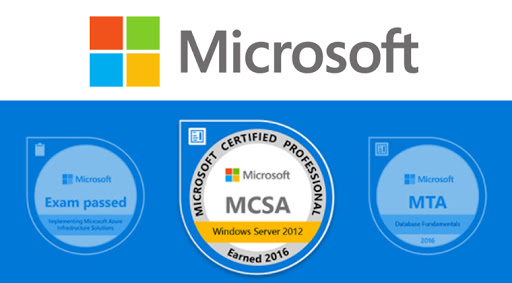Formation MTA Examen 98-365: Windows Server Administration Fundamentals in Guelmim-Oued Noun MOROCCO
Compétences mesurées
Compréhension de l’installation des serveurs (10–15%)
• Understand Device Drivers.
o installation; removal; disabling; update/upgrade; rollback;
troubleshooting; Plug and Play (PnP); IRQ; interrupts;
driver signing, managing through Group Policy
• Understand Services.
o what services are; which statuses a service can be in;
startup types; recovery options; delayed startup; Run As
settings for a service; stopping or pausing a service;
service accounts, dependencies
• Understand Server Installation Options.
o Choose the correct operating system version options;
Server core vs. Desktop Experience, Nano Server
installation, interactive installs; automated install using
WDS; VHD/VHDX installation source, perform unattended
installs; perform upgrades, clean installs, and migrations
Compréhension des rôles serveur (25–30%)
- Identify Application Servers.
o mail servers; database servers; collaboration servers;
monitoring servers; threat management
• Understand Web Services.
o IIS, WWW, and FTP, installing from Server Manager,
separate worker processes, adding components, sites,
ports, SSL, certificates
• Understand Remote Access.
o Remote assistance, remote administration tools, Remote
Desktop Services, multi-point services, licensing, RD
Gateway, VPN, application virtualization, multiple ports
• Understand File and Print Services.
o local printers; network printers; printer pools; Web
printing; Web management; driver deployment; file,
folder, and share permissions vs. rights; auditing; print job
management
• Understand Server Virtualization.
o Virtual memory, virtual networks, snapshots and saved
states, physical to virtual conversions, virtual to physical
conversions, VHD and VHDX formats, nested virtualization
Compréhension d’Active Directory (20–25%)
- Understand Accounts and Groups.
o domain accounts; local accounts; user profiles; group types; group scopes; group
nesting
• Understand Organizational Units (OUs) and Containers.
o purpose of OUs; purpose of containers; delegation; default
• Understand Active Directory Infrastructure.
o Domain controllers. forests, child domains, operation master roles, domain vs.
workgroup, trust relationships, functional levels, deprecated functional levels,
namespace, sites, replication, schema, Passport
• Understand Group Policy.
o group policy processing; Group Policy Management Console; computer policies;
user policies; local policies
Compréhension du stockage (10–15%)
- Identify Storage Technologies.
o Advantages and disadvantages of different storage topologies, local storage,
network storage, Fibre Channel, iSCSI hardware
• Understand RAID.
o RAID 0, RAID 1, RAID 5, RAID 10 and combinations; hardware and software RAID
• Understand Disk Types.
o basic disk; dynamic disk; mount points; file systems; mounting a virtual hard disk;
distributed file systems; optical disks
Compréhension de la gestion des performances du serveur (10–15%)
• Identify Major Server Hardware Components.
o memory; disk; processor; network; 32 and 64 bits; removable drives; graphic
cards; cooling; power usage; ports
• Understand Performance Monitoring.
o methodology; procedures; creating a baseline; perfmon; Resource Monitor; Task
Manager; performance counters, Data Collector Sets
• Understand Logs and Alerts.
o purpose of performance logs and alerts
Compréhension de la maintenance du serveur (15–20%)
- Identify Steps in the Startup Process.
o BIOS; bootsector; bootloader; MBR; boot.ini; bcdedit; POST; Safe Mode
• Understand Business Continuity.
o backup and restore; disaster recovery; clustering; Active Directory restore; folder
redirection; data redundancy; uninterruptible power supply (UPS)
• Understand Updates.
o software; driver; operating systems; applications; Windows Update; Windows
Server Update Services (WSUS)
• Understand Troubleshooting Methodology.
o processes; procedures; best practices; systematic vs. specific approach; perfmon;
Event Viewer; Resource Monitor; Information Technology Infrastructure Library;
central logging; event filtering; default logs
 International Private School of Technology المدرسة الدولية الخاصة للتكنولوجيا Private School مدرسة خاصة للتكوين المهني
International Private School of Technology المدرسة الدولية الخاصة للتكنولوجيا Private School مدرسة خاصة للتكوين المهني



You must be logged in to post a comment.